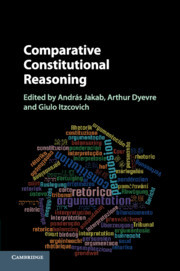Description
Comparative Constitutional Reasoning
Coordinators: Jakab András, Dyevre Arthur, Itzcovich Giulio
A large-scale comparative work of leading cases examines judicial constitutional reasoning in eighteen different legal systems globally.
Language: English
Subject for Comparative Constitutional Reasoning:
Comparative Constitutional Reasoning
Publication date: 12-2018
Support: Print on demand
Publication date: 12-2018
Support: Print on demand
Comparative Constitutional Reasoning
Publication date: 04-2017
Support: Print on demand
Publication date: 04-2017
Support: Print on demand
Description
/li>Contents
/li>Biography
/li>
To what extent is the language of judicial opinions responsive to the political and social context in which constitutional courts operate? Courts are reason-giving institutions, with argumentation playing a central role in constitutional adjudication. However, a cursory look at just a handful of constitutional systems suggests important differences in the practices of constitutional judges, whether in matters of form, style, or language. Focusing on independently-verified leading cases globally, a combination of qualitative and quantitative analysis offers the most comprehensive and systematic account of constitutional reasoning to date. This analysis is supported by the examination of eighteen legal systems around the world including the European Court of Human Rights and the European Court of Justice. Universally common aspects of constitutional reasoning are identified in this book, and contributors also examine whether common law countries differ to civil law countries in this respect.
1. Introduction: comparing constitutional reasoning with quantitative and qualitative methods András Jakab, Arthur Dyevre and Giulio Itzcovic; 2. The High Court of Australia Cheryl Saunders and Adrienne Stone; 3. The Austrian Constitutional Court Konrad Lachmayer; 4. The Supreme Federal Court of Brazil Conrado Hübner Mendes; 5. The Supreme Court of Canada Hugo Cyr and Monica Popescu; 6. The Constitutional Court of the Czech Republic Zdeněk Kühn; 7. The European Court of Human Rights Janneke Gerards; 8. The European Court of Justice Giulio Itzcovich; 9. The French Constitutional Council Arthur Dyevre; 10. German Federal Constitutional Court Michaela Hailbronner and Stefan Martini; 11. The Constitutional Court of Hungary András Jakab and Johanna Fröhlich; 12. The Supreme Court of Ireland Eoin Carolan; 13. The Israeli Supreme Court Suzie Navot; 14. The Constitutional Court of Italy Tania Groppi and Irene Spigno; 15. The Constitutional Court of South Africa Christa Rautenbach and Lorens du Plessis; 16. The Spanish Constitutional Court Marian Ahumada Ruiz; 17. The Constitutional Court of Taiwan Wen-Chen Chang; 18. The Supreme Court (House of Lords) of the United Kingdom Tamas Gyorfi; 19. The Supreme Court of the United States Howard Schweber and Jennifer L. Brookhart; 20. Conclusion András Jakab, Arthur Dyevre and Giulio Itzcovich.
András Jakab is the Director of the Institute for Legal Studies at the Centre for Social Sciences, Hungarian Academy of Sciences. He is also Professor of Constitutional and European Law at Pázmány Péter Catholic University, Budapest.
Arthur Dyevre is Associate Professor of Empirical Jurisprudence at the Faculty of Law, Katholieke Universiteit Leuven, Belgium. He works in the fields of legal theory, judicial behaviour, European integration, comparative law and comparative politics.
Giulio Itzcovich is Associate Professor of Philosophy of Law in the Department of Legal Science, Università degli Studi di Brescia, Italy. He is also a permanent fellow of the Tarello Institute for Legal Philosophy at Università degli Studi di Genova.
Arthur Dyevre is Associate Professor of Empirical Jurisprudence at the Faculty of Law, Katholieke Universiteit Leuven, Belgium. He works in the fields of legal theory, judicial behaviour, European integration, comparative law and comparative politics.
Giulio Itzcovich is Associate Professor of Philosophy of Law in the Department of Legal Science, Università degli Studi di Brescia, Italy. He is also a permanent fellow of the Tarello Institute for Legal Philosophy at Università degli Studi di Genova.
© 2024 LAVOISIER S.A.S.




